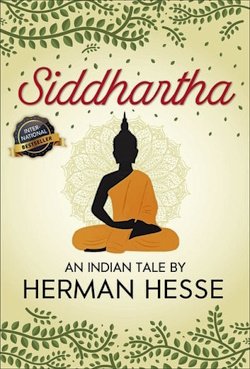Man disposes himself and looks upon this disposition [as the world]. That man is time is undeniably like this. One has to accept that in this world there are millions of objects and that each one is, respectively, the entire world—this is where the study of Buddhism commences. When one comes to realize this fact, [one perceives that] every object, every living thing is the whole, even though it itself does not realize it. As there is no other time than this, every being-time is the whole of time: one blade of grass, every single object is time. Each point of time includes every being and every world.3
3. Is enlightenment just a form of dissociation or some variety of sophis-ticated stoicism adopted by an individual in order to cope with life’s vicissitudes? Interpret the phrases from the text, “. . . when he did not tie his soul to any particular voice and submerged his self into it . . . his self had flown into the oneness.” Is, then, Atman, Brahman?
4. Discuss whether when Siddhartha hears the many voices of the river as Om, he is also affirming Schopenhauer’s recognition that “All the cru-elty and torment of which the world is full is in fact merely the necessary result of the totality of the forms under which the will to live is objecti-fied.”4?
1914.
3.
Quoted in Philip Kapleau. The Three Pillars of Zen. New York: Harper & Row, 1966.
298.
4.
Arthur Schopenhauer. Parerga and Paralipomena. Oxford: Oxford University Press (1851) 1997. Vol. 2, Ch. 14, Sect. 164.
116
Siddhartha: An Open-Source Text

Chapter 12
Govinda
India’s Sacred Lotus, Library of Congress
From the reading. . .
“Perhaps that you’re searching far too much? That in all that searching, you don’t find the time for finding?”
Ideas of Interest from “Govinda”
1. Explain Siddhartha’s observation that when seeking becomes a goal-in-itself for Govinda, enlightenment is not possible. Is it that Govinda is not separate from his goal or is it that Govinda should not have a goal?
2. Explain what Siddhartha means when he states that wisdom cannot be communicated. Can you think of some specific examples illustrating this insight?
117
Chapter 12. Govinda
3. Evaluate Siddhartha’s claim that “The opposite of every truth is just as true!” Can you adduce some examples which show what Siddhartha means?
4. What are some of the insights Siddhartha has learned throughout his life? Are these insights just meaningful with respect to Siddhartha’s life or would they also be useful in contemporary times?
5. What would be some of the implications of the fact that time is not real?
Is it inconceivable that time is an a priori construction of the human mind?
6. How does Govinda know that Siddhartha has reached enlightenment?
What are the signs of this recognition?
The Reading Selection from “Govinda”
Together with other monks, Govinda used to spend the time of rest between pilgrimages in the pleasure-grove, which the courtesan Kamala had given to the followers of Gotama for a gift. He heard talk of an old ferryman, who lived one day’s journey away by the river, and who was regarded as a wise man by many. When Govinda went back on his way, he chose the path to the ferry, eager to see the ferryman. Because, though he had lived his entire life by the rules, though he was also looked upon with veneration by the younger monks on account of his age and his modesty, the restlessness and the searching still had not perished from his heart.
He came to the river and asked the old man to ferry him over, and when they got off the boat on the other side, he said to the old man, “You’re very good to us monks and pilgrims, you have already ferried many of us across the river.
Aren’t you too, ferryman, a searcher for the right path?”
Siddhartha, smiling from his old eyes, said, “Do you call yourself a searcher, oh venerable one, though you are already of an old in years and are wearing the robe of Gotama’s monks?”
“It’s true, I’m old,” spoke Govinda, “but I haven’t stopped searching. Never I’ll stop searching, this seems to be my destiny. You too, so it seems to me, have been searching. Would you like to tell me something, oh honourable one?”
Siddhartha said, “What should I possibly have to tell you, oh venerable one?
Perhaps that you’re searching far too much? That in all that searching, you don’t find the time for finding?”
“How come?” asked Govinda.
118
Siddhartha: An Open-Source Text
Chapter 12. Govinda

























